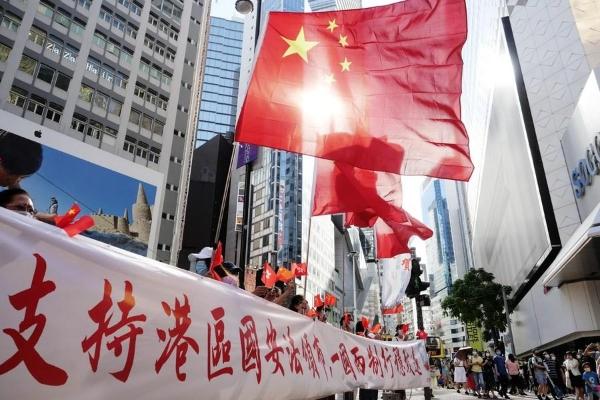

Hong Kong citizens celebrate the passage of the Law of the People's Republic of China on Safeguarding National Security in the HKSAR in Causeway Bay of south
China's Hong Kong, June 30, 2020. [Photo/Xinhua]
The Commissioner's Office of the Chinese Foreign Ministry in the Hong Kong Special Administrative Region published a strongly-worded letter on Thursday criticizing the US newspaper Wall Street Journal for claiming in an editorial that the new national security ordinance is "a giant leap backward" and will "lock Hong Kong people up", as the new ordinance comes into effect.
The article also claimed that Hong Kong is "not enough" for having the "controversial" National Security Law for Hong Kong, and therefore comes a "sweeping" and "vague" new legislation.
A spokesperson for the office said the sensational accusation is just a "silver bullet" for the newspaper to catch readers' eyes, saying such kinds of constant smears have deterred some businesspeople in the United States from visiting Hong Kong for the fear of being "locked up", the spokesperson heard.
"I believe many Western media outlets, including The Wall Street Journal, should take credit for their distorted Hong Kong impression," the spokesperson said.
The spokesperson said the National Security Law implemented in 2020 covers only two of the seven categories of crimes under Article 23 of the Basic Law, namely secession and subversion, and the other five crimes, such as treason and theft of State secrets, are not included.
Furthermore, some provisions in Hong Kong's laws still retain terms such as "the Crown", referring to British monarchs in colonial days, the spokesperson pointed out, emphasizing that it is fully justified for Hong Kong to close the legislative gap with the new ordinance.
As for labeling the new national security ordinance as "sweeping" and its terms "conveniently vague", the spokesperson called the remarks a downright double standard. The law is consistent with the definitions of terms in different places' national security legislation and has taken Hong Kong's reality into full consideration, the spokesperson said.
No text in the law says it regards foreign influences as a threat — unlike the editorial wrote, the spokesperson said.
The letter also said that although the newspaper has been doomsaying China for decades, it has been pathetically inaccurate.
The national security ordinance, cleared by the city's legislature on Tuesday, was made to prevent, deter and punish five types of acts endangering national security, including treason, theft of State secrets and espionage.
On Friday, more Hong Kong people stood out and protested against the smears by some Western politicians on the city's national security ordinance.
A flock of people rallied outside the British consulate general in Hong Kong, condemning the biased remarks made by British politicians, including former UK prime minister and current Foreign Secretary David Cameron and former British governor of Hong Kong Chris Patten, regarding the legislation.
Several groups also organized a protest at the US consulate general in Hong Kong, saying the ordinance won broad support during its monthlong public consultation, and it will better protect Hong Kong society and enterprises.
